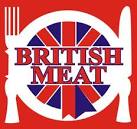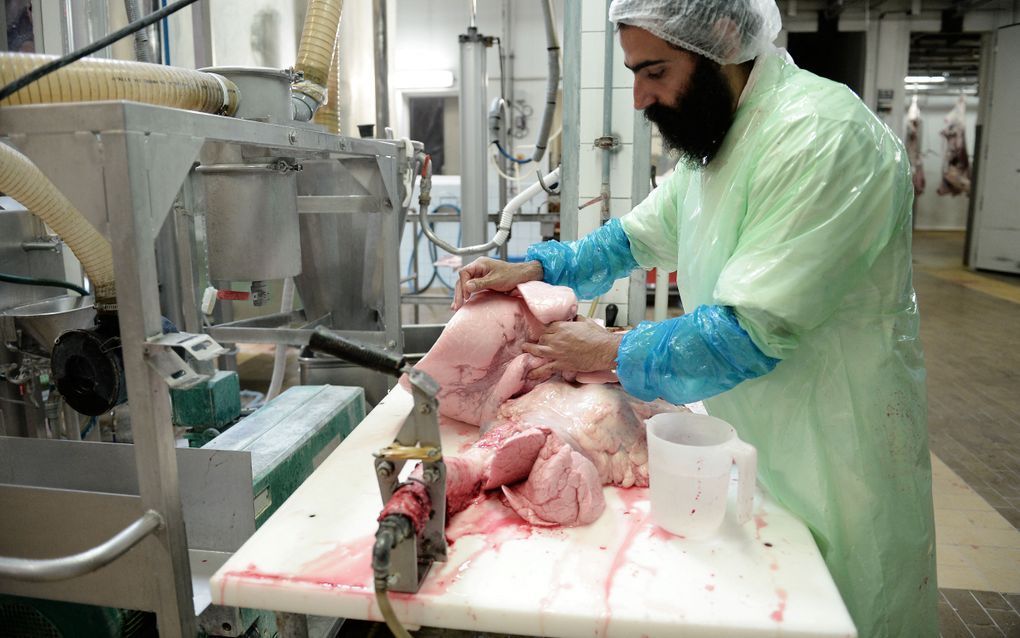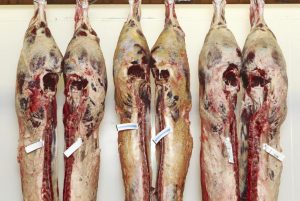 The latest parliamentary debate on the future of shechita has seen MPs put forward robust defences of kosher and halal religious slaughtering practises.
The latest parliamentary debate on the future of shechita has seen MPs put forward robust defences of kosher and halal religious slaughtering practises.
A three-hour session in Westminster Hall heard from more than a dozen speakers from across the political spectrum.
The debate was called after a British Veterinary Association-backed petition calling for a ban on non-stun slaughter generated 100,000 signatures in nine months.
Politicians speaking in today’s session highlighted a similar petition, in favour of continuing religious slaughter, which has attracted more than 123,000 signatures in a week.
Conservative MP Philip Hollobone, opening the debate, said he believed there was an “overwhelming number of people who want to see non-stun slaughter ended in this country”.
Campaigners’ concerns related to animal welfare, he said, and were not prompted by opposition to religious beliefs. But he admitted it was impossible to discuss the issue without considering the religious perspective as well.
“That is the elephant in the room. Jewish and Muslim communities have a lot of persuading to do if they want their point of view to win the day.”
Mr Hollobone said 80 per cent of animals killed in halal slaughters were pre-stunned.
“These issues need to be debated in Parliament,” he said. “It’s an issue which generates a lot of interest up and down the country.”
He called for clearer labelling to show how animals had been killed, with a better indication given to consumers of whether the animal had been stunned or not, and whether the food was kosher or halal.
“If you’re a Jewish constituent and you want to eat kosher meat and you see the product labelled ‘shechita’ then it is helpful,” Mr Hollobone added. He said he had been following the debate on religious slaughter by reading the JC every week.
Labour MP Shabana Mahmood said there had been a degree of hysteria around the issue.
“Religious minorities rightly feel picked on and scrutinised, as if to say their way of life was cruel. It’s an unfair characterisation,” she said.
Sir James Paice, Conservative MP for South East Cambridgeshire, said a visit to a halal abattoir had convinced him that post-cut stunning – when an animal was rendered senseless after being shot with a bolt through the head immediately after having its throat cut – could have a “significant” impact on religious slaughter. It would be a compromise that may suit most parties in the process, he said.
He said additional labelling could be “wide-open to abuse” because it would be hard to follow meat from its slaughter to eventual sale.
Sir James said it would also be seen as “racist” if labels differentiated between meat items produced as a result of religious slaughter and those that were not.
Watford MP Richard Harrington said he had received assurances from David Cameron that the government would not ban either kosher or halal slaughter.
Mr Harrington said he was Jewish but did not keep kosher, but he was concerned for the rights of Jewish and Muslim constituents who would be affected by changes to current slaughter arrangements.
He highlighted the strength of feeling – and numbers – behind petitions on both sides of the argument.
Louise Ellman, veteran Labour MP, said allowing kashrut to take place in Britain was seen as an important part of Jewish life. It would be a “sad day” if a ban was introduced, she said.
Hackney North and Stoke Newington MP Diane Abbott said Muslim and Jewish faith communities in her constituency were concerned that some campaigners opposing religious slaughter were being “antagonistic” in their efforts.
Mike Freer, Finchley and Golders Green MP, said he believed the public was “completely divided” on the topic.
“Our constituents are concerned about the motives behind some of this,” he added. “The vast majority are concerned by animal welfare, but for some it’s a flag of convenience.”
He said there was antisemitism and Islamophobia “lurking” behind some arguments against religious slaughter, with letter-writers referring to “men with beards” and “Muslim meat” in their complaints to him.
MPs voted only on whether they agreed that the issue had been debated, rather than on whether they were in favour of religious slaughter or not.
Huw Irranca-Davies, Labour’s Shadow Minister for Food and Farming, said: “Those who condemn the slaughter practices of religious communities should be aware that those who practice shechita or halal do it with the best interest of the animal in mind, and attempt to do that to the highest standard.”
He said Labour would await European Union instruction on the issue of labelling, and said that any future ban on non-stun slaughter would not stop consumption of imported non-stunned meat.
George Eustice, Parliamentary Under Secretary of State for farming and food, repeated the government’s preference for pre-stunning.
He added: “I think that we can be clear that we could have ‘stunned’ or ‘unstunned’ as a form of labelling. There are difficulties in labelling things just as ‘halal’ or ‘kosher’. We await the report from the European Commission.
“The government have no plans at all to ban religious slaughter. The Prime Minister has been absolutely clear that there is no intention to ban religious slaughter. However, everyone agrees that we need good enforcement of our existing legislation.”
Mr Eustice said the government would begin a series of unannounced, random inspections of British slaughterhouses.
Ahead of the session, campaign group Shechita UK had said the British Veterinary Association was “negligent, obsessed and politically driven” in its arguments against religious slaughter.
Dr Shuja Shafi, secretary general of the Muslim Council of Britain, said: “Islam and Judaism, like other faiths, require animals to be treated humanely at all times.
“The British Veterinary Association (BVA) should stop fanning the hysteria around religious slaughter and ‘get real’ on the true priority of animal welfare.
“If the BVA are genuinely concerned about animal welfare, we need to hear what they are doing about the duty of veterinarians to ensure the welfare of animals in the slaughterhouses, at all times, given the abuses reported.”
Following the debate, Shechita UK, which campaigns in support of religious slaughter, thanked the MPs who defended shechita.
Director Shimon Cohen said: “Once again, the position of the Jewish community as regards religious slaughter has been extremely well represented and the debate was in fact dominated by those whose priority was the protection of shechita.”


